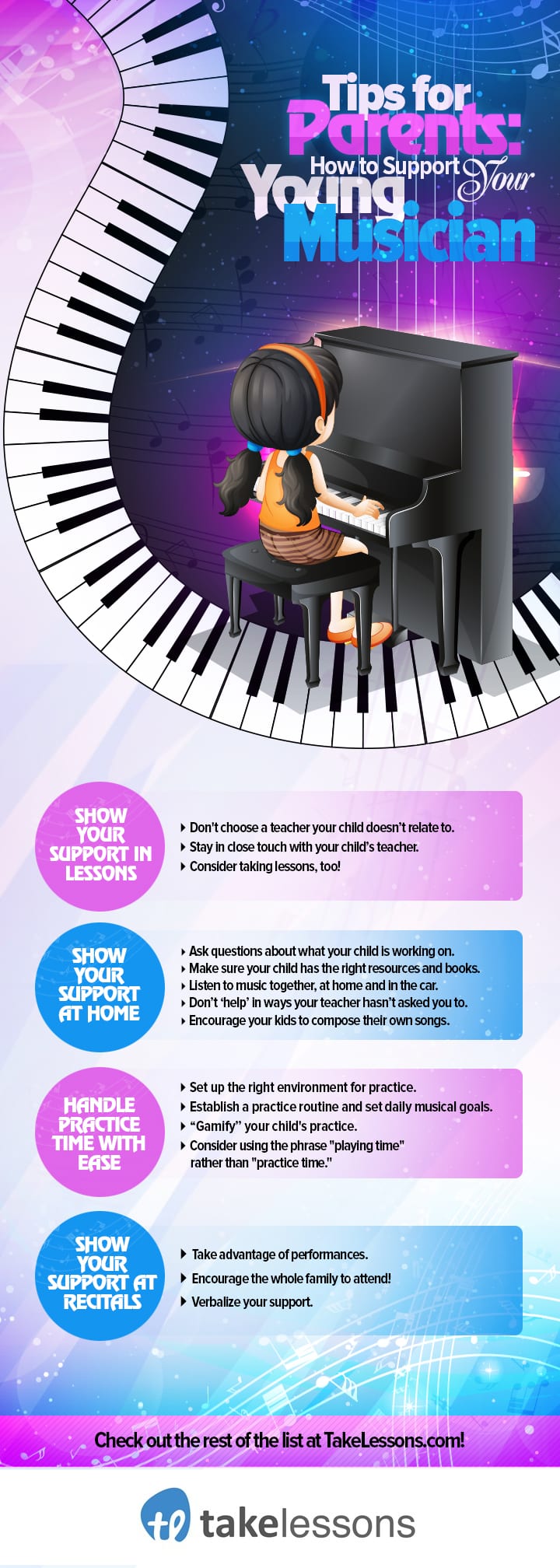Parents, wondering how to best show your support as your child starts music lessons? Read on for a round-up of the best tips from piano teacher Rhonda B., plus a few other prominent piano bloggers…
So you’ve enrolled your child in piano lessons. End of story, right? No. Learning this challenging instrument — or any instrument, at that — will require a long-term commitment of at least a few years. It takes teamwork to make it happen.
My student Mallory’s mother, Christy, understands this. A couple of months ago, she asked for a consultation during lesson time, and explained her concerns that her 13-year-old daughter seemed to be losing interest in lessons. The three of us agreed to concentrate on making practice times consistent and holding Mallory more accountable. Mom, student, and teacher cooperated toward a mutual goal.
Since the consultation, Mallory’s practicing has improved 100%. This helps her to enjoy lessons and to progress more quickly. She recently nailed her assignment piece, a rendition of “Maple Leaf Rag.” Sweet success! And it happened because a concerned mom walked the extra mile to lend a hand to her struggling daughter.
Kids need their parents’ assistance, encouragement, understanding, and occasional firmness to help them master their music assignments and progress. This is especially true of young beginners — ages 5 to 7 — but also for students of all ages. Mom and Dad can help even if their knowledge of music is practically zero.
You, too, can achieve the status of a perfect piano parent. Here are 25 suggestions for helping kids learn piano and showing your support.

Is your child nervous about taking lessons? That’s normal! Ensure a smooth start with these tips…
Start at the right time. Consider if your child is really ready for piano lessons. Although some teachers will take students at very early ages, there are general guidelines for the best age to start piano lessons.
Don’t choose a teacher they don’t relate to. If your child doesn’t like his or her music teacher, this may reflect negatively on the experience. If your child is complaining about their teacher, ask them to share what they don’t like about them. Listen without trying to convince them differently. (via The Child Whisperer)
Stay in close touch with teachers. Keep your instructors informed of what’s happening at home. They can adjust their expectations, change the music, revise the lesson format, switch to better times or days, and more.
See if you can get involved. Check with your teacher to see if he or she suggests sitting in on the lessons — this works for some kids, but not for all.
Consider taking piano lessons at the same time. Be a terrific role model by practicing what you preach, and show your children that you are as human as they are when it comes to making mistakes. Bonus: Playing duets together can be a great way to bond!
Helping kids learn piano begins with a supportive home environment! Here are some tips…
Ask questions about what your child is working on. Listen to some of the assigned composers’ music on YouTube together. My student Aiden’s mom helped him find a ragtime version of “Everything Is Awesome”… which got her son really excited about the song.
Make sure your child has the right resources & books. Talk to your child’s teacher and ask about getting a theory book to accompany the lesson book. There’s a good chance that your teacher will suggest one to begin with. If not, ask for one. (via KeytarHQ)
Encourage other family members to applaud your child’s efforts. Positive attention is a great motivator. (via FamilyEducation)
Listen to music at home and in the car. It really doesn’t matter what you listen to – rock, country, classical, pop, or indie – what matters is that you let your kids see you bebopping along to it. Encourage singing and dancing as much as possible!
Head off burn-out. Kids may need to push through a tough stage, but at other times, a reward can help. For my student Matthew’s outstanding lesson last week, for example, his mother treated him to Dunkin’ Donuts.
Realize that it’s a process. There usually isn’t fast progress, but if students consistently practice, they will see wonderful results over time. This really is a case where slow and steady wins the race. (via Laura, Laura’s Music Studio)
Be especially supportive when they have a bad day. Music lessons are hard and get harder every week. While your child may be picking up their lessons at a fast pace, they won’t always. There will come days when your child has a tough time learning something and gets frustrated. Explain everyone has a tough day or two from time to time and to be patient. Help them through it. (via Piano Wizard Academy)
If there’s a growing attitude problem, try to identify the heart of the issue.
Does Kaitlyn really hate the piano, or is she frustrated because she can’t seem to master the B section of “Musette”? What’s the real issue?
Be wary of unrealistic expectations. People often vastly underestimate how difficult music can be. It’s best to have as few expectations as possible, and take every development as a gift when it comes. (via The Wise Serpent)
Don’t ‘help’ in ways the teacher hasn’t asked you to. For example, don’t write the names of the notes in the music for your child. (via Elissa Milne – from her article 15 Things You Need to Know About Supporting Your Child Learning to Play the Piano)
Encourage your kids to compose their own songs! Being creative in this way is not only fun, it instills deeper music intelligence, fosters general life skills, and increase self-confidence.
Not sure how to motivate your child to practice? Here’s what you need to know…
Set up the right environment for practice. Make sure your kids are practicing in a comfortable place, with all the supplies they need. Here’s a great resource from AMP (the National Association of Music Parents).
Establish a practice routine. Explain that practicing is non-negotiable… like completing math homework or eating vegetables or tackling chores. Make it doable by insisting on regular practice times when students are rested and alert.
Consider using the phrase “playing time” rather than “practice time.” (via FamilyEducation)
Establish daily musical goals. For example, instead of saying that 30 minutes of practice is enough regardless of what is achieved, you might say, “Today the goal of practicing is to play the first eight measures of your piece without any mistakes.” (via PBS Parents)
Game-ify your child’s practice, such as with the ideas in this article from NPR.
Piano recitals are the perfect opportunity for your child to show off what he or she has learned! Increase your child’s confidence with these tips…
Take advantage of performances. Nothing motivates student practicing like preparing to play publicly, whether it’s a formal studio recital, sharing a piece in music class at school, or jamming with the church’s youth band.
Encourage the whole family to attend! Fill the crowd with friendly faces to fend off nerves and make your child feel especially excited about performing.
Prepare your child for mistakes before the recital. Tell a funny story about a time when you flubbed something or suffered a pratfall. Make light in advance of any looming catastrophe. Make it clear that a mistake is “no big deal.” (via The Happy Piano Professor)
Verbalize your support. All students wonder sometimes: is all their practicing worthwhile? Does anybody care about it? Are they sounding better than they did a year ago? A thoughtful, positive comment from a parent can help them persevere.

Share this Image On Your Site
Learning to play a musical instrument, especially one as difficult as piano, requires teamwork. Students learn and practice. Instructors teach, guide, and gently prod toward excellence. Moms and dads enforce practicing, support the instruction, and stay attuned to their children’s struggles and victories. Together they form a win/win/win team, thanks in part to the perfect piano parent’s involvement.
Want more tips? Check out Anthony Mazzocchi’s book, The Music Parents’ Guide: A Survival Kit for the New Music Parent.
Teachers and parents, what other tips would you recommend for helping kids learn piano? Let us know in the comments!
Rhonda Barfield has taught piano for 20+ years in two piano schools and now at her home studio. She has a B.A. in Music Education from Culver-Stockton College, and studied post-graduate piano with instructors at Truman State University. Rhonda operates Listening House Studios in St. Charles, Missouri with her son and business partner Eric. Book lessons here!
Photo by Michael Cisneros
Suzy S.
![25 Tips for Supporting Your Young Musician [Infographic]](/_next/image?url=https%3A%2F%2Ftakelessons.com%2Fblog%2Fwp-content%2Fuploads%2F2015%2F07%2F100-ways-to-be-the-perfect-piano-parents.jpg&w=3840&q=75)



